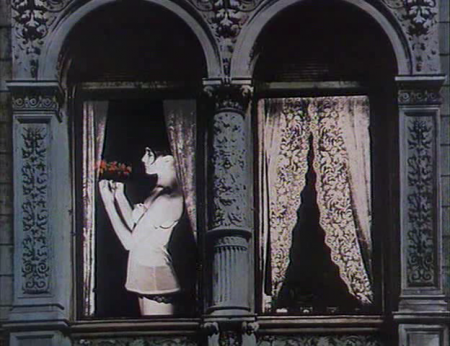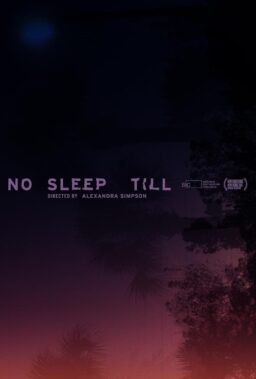Poland-born director Walerian Borowczyk’s cinema is neither
decorative not decorous. In both his animated and live-action films, he favors
plainly-composed head-on shots, mostly medium in length. His lighting is
generally flat. Although he concocts startling images, he very rarely makes
pretty ones. Even in a film set in 13th-century France, he favors
cinema language that is almost pedestrian. And yet every one of his films—his
career extended from the mid-‘40s until the early ‘90s, and he died in
2006—startle in some way.

Arrow, the exceptionally adventurous video label from
England, shows both considerable skill and considerable daring in its limited
edition “Boro Box,” a dual-format, multi-disc set that collects five of
Borowczyk’s features and 15 of his shorts (both animated and live-action) and
also includes an exhaustive book of biography and criticism, which, turned
over, reveals another book of the filmmaker’s short stories and drawings. It’s
a head-spinning crash course in the works of a filmmaker who’s not easy to
like—he’s not nearly as intellectually adroit or witty as, say Luis Buñuel, to
name a cinematic provocateur who was a major influence on Borowczyk—but whose
ability to appall and exhilarate and to make one fall sideways laughing at
erotic absurdity will certainly find appreciation from anyone whose taste for
the Psychotronic runs to extremes.
Margolit Fox, in her 2006 New York Times obituary, wrote of
Borowczyk that he was “described variously by critics as a genius, a
pornographer and a genius who also happened to be a pornographer.” The problem
with this assessment is that even at its most sexually explicit, and be warned,
the work could get very sexually explicit indeed, Borowczyk never betrays a
desire to arouse. His most notorious film, 1975’s “The Beast,” included in this
set, opens with a scene of unsimulated horse-mating, and ends with a dream
sequence in which a maiden is ravished, in a variety of ways and positions, by
a man-beast with a massive and rather silly-looking tool of reproduction that
keeps spouting…well, you get the idea. I can’t imagine a human being finding
such stuff genuinely stimulating in the way that pornography itself actually
has to intend in order for it to be pornography (and no jokes about Comic-Con
attendees and their predilections, please). So if Borowczyk’s not a
pornographer, what is he?
The keys are found in the early work collected in the Arrow
box. I won’t lie: my favorite is very first, the “Short Films And Animation,”
which contains a beautiful rendering of the 1958 short “Astronauts,” a picture
he made with the legendary Chris Marker soon after relocating to France. Like
the films of Czech director Karel Zeman, Borowczyk’s animated work provides the
delightful missing links between Melies and Terry Gilliam; “Astronauts” is a
work of whimsical subversion and freedom. Boro’s 1963
destroyed-room-reversal-and-loop 1963 masterpiece “Renaissance” anticipates The
Quay Brothers while indulging a fantastic anarchical streak, something pushed
to full throttle in his 1967 animation/live-action hybrid “Theater of Mr. and
Mrs. Kabal.” David Thomson, a critic who is nothing if not discriminating,
pronounced Borowczyk “one of the major
artists of modern cinema” strictly on the strength of these works. He’s not
wrong. Power relations, both political and sexual, are the subjects of his two
live-action features collected here, 1968’s grim and grimly funny totalitarian
allegory “Goto: Isle Of Love” and the 13th-Century tale of amorous
machinations in a French court, 1971’s “Blanche.”

It gets tougher, though, to suss out what Boro is on about
as the work gets more explicit. Various accounts of the filmmaker find him, in
a fashion not unreminiscent of the career travails of rough-hewn erotic
fantasist Jean Rollin, making a kind of Faustian bargain with sex-content
hungry European film producers in an effort to realize a vision. But as out
there as the content of “Immoral Tales” gets (Paloma Picasso’s Elizabeth De
Bathory really does take a rejuvenating bath in the blood of slaughtered
maidens, and a comely Borgia has sex with an uncle, who happens to be the
gosh-darn Pope), there’s something about its cinematic detachment that makes me
either uncomfortable or indifferent, I can’t say which. As for “The Beast.”
Well, as I mentioned before, it opens with an explicit scene of horses mating.
To which I say, “ew,” but after saying that, I think, why I should be
mortified, let alone be mortified by the prospect of potential mortification on
the part of you, the reader, when, after all, a much-respected film like
Bertolucci’s “1900” opens its second half with unsimulated footage of a live
pig’s transformation into sausage, and few critics or viewers go to the
fainting couch over that? This is a distinction worth thinking about, so why do
I resent “The Beast” for compelling me to think about it? Borowczyk’s key strength as a filmmaker could
be his desire to show us things we don’t want to see, and to show them in the
plainest light. The perversions on display in “The Beast” have a laughable
dimension to them, but its evocation of a sexuality whose exhaustion brings
death speaks to some of civilization’s most enduring hang-ups.
This is hardly the only question brought up by the material
in this incredible set, which features nothing but beautifully rendered
transfers, terrifically stimulating and exhaustive extras, and superb critical
texts. As much as some of the stuff here irritates and frustrates me, it’s made
me even more curious than I once was about the rest of Borowczyk’s work. I’m
pleased, then, to learn that Arrow’s not through with its exploration of the
filmmaker yet, and will release his 1982 “Docteur Jekyll et les femmes” in
2015.












